In the first instalment of a new column documenting her life between moor and sea in Devon, Kirsteen McNish is warmed by the yellows of Ostara, Dartmoor and Etel Adnan.
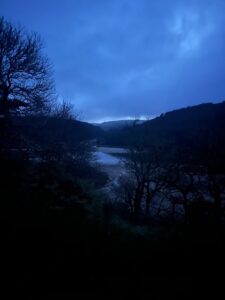
“To look at the sea is to become what one is” – Etel Adnan
Feeling sea-tossed after a rough night’s sleep I rise, rubbing out the faces that appear in my dreams that belong to my past, turning my back and walking away, closing a lid tight on a fizzing bottle. Life changes and loss have facilitated much-needed boundaries in my walking hours but it’s night-time when the spectres revisit my edges — whittling away at the high but porous sea walls.
At home the house is being unpicked, floors are taken up, collapsing rotten joists resemble soggy digestive biscuits where a steady set of slow trickles have evidently been hovering in the spaces between the floorboards, apparently readying themselves for a final deluge into the hallway below. Newly painted floorboards are ripped up in a frenzy, pipes snap like brittle bones with no discernible joints and water ingresses down the walls into strange brown clouds, bustling at the seams of the ceiling. I pack a bag, resigned, and we drive twenty minutes to the coast. Too exhausted to fret, we fumble our way into a two-day holiday rental and fall asleep almost immediately — as I settle my daughter she pads my legs with her feet like a young cat, a self-soothing when within strange walls. Despite this she perhaps feels that the sea is close, as she smiles, nose tip pushed close to my own, and gently snores as I slip out of bed like a slinky and pull the door to, the hallway lit up by a narrow envelope of moonlight.
It’s 5am the next day as I push open the living room curtains. The morning reveals a sight for sore eyes, the fork of Ayleston Brook meets the swell of the Erme estuary and snakes away before me in royal and midnight blues and I can just make out ancient lichen-laden branches like gnarled hands curled upward, as a small boat bobs gently in the mudflats. The outline of a large house in the mid distance looks like it is tilting toward the water to take a drink, and I want to tread water to reach its opening. A dog barks and the sound rushes and echoes surreally around like a large marble in a bowl.
An hour or two later I am sat on a cement block with rusting chains looking to the sea in the far distance, watching fern-like furls of spray curl and flurry. My feet are unable to carry me quickly enough to the water’s edge — I try to be metered, to take my time, and often fail.
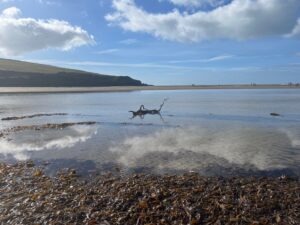
Many moons ago on a brutal crossing from Ireland to Holyhead, I meet a man who chats warmly to my friend and I whilst my mouth forms a thin line, clinging for grim death to a column on the ferry in a heavy squall. He dissolves my initial suspicion, offers his arm and leads me out on deck, prising my fingers from their grip, and tells me to always look to the horizon and the waves will seem less terrifying. Months later he unexpectedly arrives at my flat in Hull asking if I fancy a coffee, and as we walk the avenues fecund with jasmine and honeysuckle bursting from gardens, he laughing as he asks me why I move so quickly, encouraging me to stop and look. I never see him again. Years later I wonder if I imagined him as a portent of things to come after the advent of my first child, whose interest in the minute tempers my pace.
The Estuary is flanked by acres of the Fleet Estate, and a convergence of Wonwell Sands and Mothecombe Beach lay before me. At the sea edge it feels like two billowed sleeved arms reach out and touch fingertips at low tide, but quickly draw back when one denies the other’s existence again due to rocky crags and the river flowing between them. Mothecombe (or Meadowsfoot beach as it was once called) sits open wide and welcoming, nestled into the hillside flanked by woody staccato walkway and lush gardens to the right full of Rhododendrons. A handsome grey Victorian beachhouse is carved out of a tin mine and a second world war pillbox resides on the cliffside, the soft curve of the hills in the distance. Wonwell, my first love in Devon, is the more complicated, a narrow and craggy sibling, and is just out of reach today. Swathes of clear running water are graced by gulls, bitterns and two white swans; eerie and almost motionless, necks turned to each other in a strange, crooked heart. Green moss and seaweed curl, ribbon-like, and buzzards mew to each other, circling the patchwork fields of the headland that lead up to Thurlstone, dotted by grazing cattle.
I try to think of nothing. My body aches from another night’s tension that I push away in the daytime but creeps up on me in slumber like Nosferatu’s cloak, waking often to numb hands and pushed out heels like I’m slamming into something at high velocity. On the concrete slab I am ever aware of my awkwardness, not really feeling like I fit in anywhere, and simultaneously having no desire to. The more distant future gingerly slithers into view occasionally — a void in my head where my fears around my eldest child swirl like a quiet boat in the ocean, rodless and anchorless. I push these fears away like one might flick the hair out of one’s eyes — tomorrow, tomorrow, shepherded away again and dissolved into this fertile landscape.
My mouth is dry, but too impatient for breakfast, I take the winding walk down to the shoreline through acid green leaves of low-arching, glistening Laurel bushes. The sun is already out and after days of rain, dirt and dust I lift my chin, slant my face toward the light, which makes me feel almost childlike. I consider etymology and the rigidity in language around difference, dis-ability, and caring and wonder why society seems to have lost its way with those more vulnerable than ourselves.
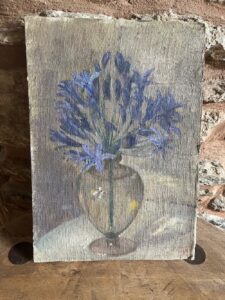
Around me there are imposing, sculptural evergreen trees and shrubs with tangled branches on vertiginous banks. I pass a locked-up outhouse with moss, pillow-like at its base and roof as crows fight bitterly like bickering teens in the top of its branches. I realise as I walk, I am yearning for the quenching yellows and ochres of lichen and gorse, and they are seeping slowly into the house, bringing the outside in in a cat’s cradle of colour. At home I plant Mimosa and Witch Hazel after battling a spaghetti junction of blackberry thorns, and hang a painting of a flower stem with a yellow fleck of light on its wonkily painted vase. I think often of an exhibition of Etel Adnan’s work called The Weight Of The World at The Serpentine six years ago, and her vibrant use of shape and colour — confident palette knife swipes on canvas conveying her deep love of landscape and her concern at the rise of the civil war and her subsequent move to California where she felt liberated. I stayed for hours, reluctant to leave, trying to imprint all her images and tapestries into my cells, drinking them up. When she spoke of Mount Tamelpais with its strong ochre as a pole of orientation, it resonated with the same pull of Dartmoor, and there was a rise in my chest as I saw the imposing, brooding ranges.
I admire and hold fast to her emotional honesty and speaking out about things that mattered to her personally and politically. Sharing her work on Instagram in lockdown inspires a person I admire, and she starts to create her own versions inspired by the bold, sumptuous colours. Light should be shared and revelled in, not borrowed or kept. On the Equinox someone @’s me on Twitter using an image I’d taken in lockdown of a rising sun like Adnan’s, flecks of chipped paint that to me look like a scream of incoming swifts seen on a shipping container — where I can’t remember, uncomplicated by imposed explanations of a curator, existing just for itself in the wild.
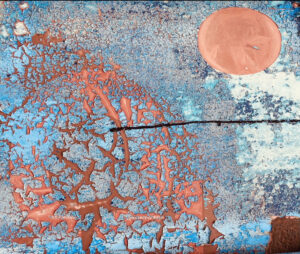
My train of thought as the water slinks past is broken by a thrumming woodpecker over my right shoulder. It’s a day before Mother’s Day, two days before the Spring Equinox, four days before the anniversary of my sister’s death, and six days before what would have been her 49th birthday, and the high hedges and my new garden are full of daffodils and primroses where snowdrops in swathes bobbed their delicate heads last month. Spring was Rachael’s time of great excitement. Time has passed so quickly since she died and even more since we moved here. October seems like a distant island I muse, sat in the backseat of the car days before I feel my limbs suddenly turn to lead whilst stroking my daughter’s hand. I realise that in four years she will no longer be in the safe harbour of school, and I feel a sudden panic — my egg-timer is flooded with quicksand — I want to stuff the days full whilst she is cared for within safe walls by people I trust. Ideas and lists swim through my head and I count her tiny but celebrated recent independent steps that would seem innocuous to most parents for a child quarter of her age. She has just completed two full weeks at school without relentless sickness that batters her so often to her edges, sometimes bringing me down in the tow. She is currently buoyant, and colour fills her cheeks where flu and viruses drained her to chalk — for two weeks she made guttural soft sounds looking directly at me in full beam as if she were trying to talk to tell me what ailed her, and my chest tightened as I tried to translate her body language. This new buoyancy and release from teenage moods is also a relief, and has stopped her flapping furiously like a kite tail in the wind, so I too feel a softening within my shoulders.
These snatched moments alone are treasured portals where I can seep back into myself a little — and slip into the shallows. In moments like this where I cannot fathom my daughter out, I may have phoned my sister, stomach flipping like a plastic fortune-telling fish between worry and guilt. Her quiet wisdom is missed and feels papercut sharp again on days of doubt, and however different we were in character, me fascinated with people, she preferring solitude, I knew she would have laid down in the dirt without thinking for her niece. I imagine my sister’s brood on this beach with me. I look toward the reeded banks of the pool behind the shoreline and see a heron rise slowly from the shadows.
Trudging up the shifting sand where pink granite-flecked stones and skate cases pepper the sand alongside slate and smashed shells, I watch as a woman in a red coat stoops every few steps and puts things into a canvas bag slung across her shoulder. As she comes close, she comments on the warm wind as it whips my hair like candyfloss, and I ask her what she is collecting. She tells me that she’s picking up litter, and I feel a sting of guilt that I have merely been looking for things to turn over between my fingers in the darkness of my pockets. Her skin is golden, hair salt and waves and her eyes a twinkly grey, and she has a healthy un-made-up glow, in contrast to my scarlet lips. In the scheme of things, she says, it is perhaps pointless, but every day it makes her feel useful, and gladly over the past few years she has seen a steady decrease of bright plastic netting, bottles and non-compostable matter on this shoreline. She wishes me well and moves on, and I am struck by this act of faith, like a dog thrown a new stick.
Hours later my small family joins me on the beach and my daughter canters towards the water soaked and trainered feet first, swishing her hands through the water like an over-energetic Narcissus, then pausing to looking into the mid-distance, quiet and thoughtful, her eyes focussing and following the auras of light with her hand. A dead carcass of a small porpoise lays a small distance behind us, log-like and almost invisibly as dogs sniff its raw flesh. It’s already been seen and tagged by Devon Wildlife, and I cannot make out the words on the label as I pull my daughter away. It’s a stark sight to see this body stranded and alone on the beach, perhaps having taken a wrong turn in the slip tide. My son practises kick-ups and I absentmindedly flip through social media to post pictures, feeling mildly irked and weary once met by its strange and fickle intermeshings. I stuff the phone into my bag, filled with stones and pulling hard against my neck and clavicle, and turn my head to look at my teenage girl. Always close to the ground, on her haunches, feet and hands on the earth, rooted, when I am in my head; always feeling her way in the flash of the moment and despite being wordless she appears to have her a knowledge and intuition most of couldn’t hold a light to, including me. Her life force is invigorated by water sources and pulls her umbilically. This intuition might not have commercial value, or thrum in ways that turn and “yield”, but she is entirely herself and un-swayed by which way the tempest is blowing. She has no instinct other than to be entirely herself, in the core of right now.
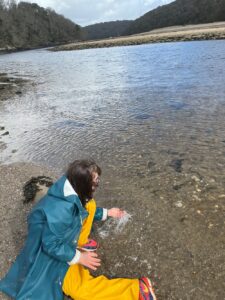
We come home, clean the house, and I light soft-hued candles as the wind whips up again outside, recycling pitting and puttering off the ground whilst bin lids rattle and snap. The house feels like a junk shop jigsaw puzzle with at least half a dozen of its pieces missing, but it’s less wilful now as we lay floors, roots, battle with garden thorns and cajole its stubborn edges, eager to feel settled, but also not able to push the river. My chest aches with the thrust that propels a mother toward its new-born — I am in deep with this quiet hamlet, and allow the new views to rinse the sediment within me.
As I walk upstairs, I watch my daughter on her feet on the living room rug, swaying flag-like in a warm slow breeze to music, holding and circling invisible threads between her fingers. She moves despite all that is held away and apart from her. She moves when the wheels spin in the mud, moves when the tide rises against her, moves in her sleep towards the moon, moves when I lack the energy to contain or carry her. She moves because she is a creature of movement. The Equinox night heralds the warmth and the light — she a small but mighty flame.
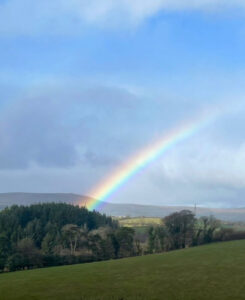
*
In memory of of our sister, Rachael.